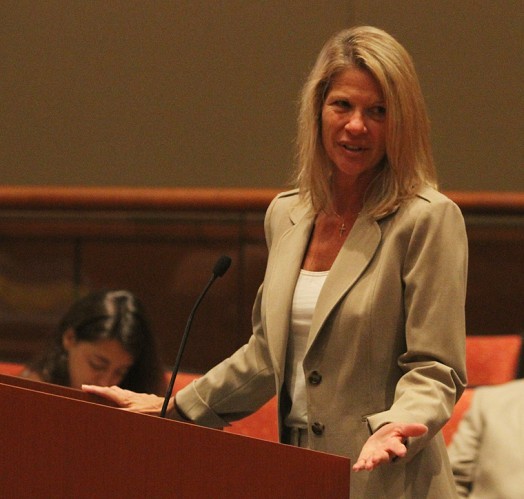Lobbyists from the Florida Municipal Power Agency and its sister organization the Florida Municipal Electric Association – who year-after-year have managed to kill every previous effort by Rep. Debbie Mayfield to regulate FMPA or its member municipal utilities – will have one final bill from her to kill this coming year before she is term-limited out of office.
House Bill 579, as proposed, would accomplish several of the things Indian River County officials and Vero Councilwoman Pilar Turner have been pressing for, including forcing the FMPA to put a dollar figure on each member city’s stake in the co-op. This has been seen as the essential first step if Vero is to ever navigate a reasonable exit from the FMPA.
In stating the case for her bill, Mayfield cited the Florida Auditor General’s finding that the FMPA’s hedging practices were riskier than industry standards, and that some of its personnel and spending policies were also criticized by auditors. FMPA ratepayers will be paying for huge losses for decades, as the co-op floated millions of dollars in new bonds to get the FMPA out of hedges on a failed project.
FMPA officials say they’ve instituted new policies to safeguard against further risk-taking and abuses, but legislators on the Joint Legislative Auditing Committee questioned that this would do any good, as FMPA doesn’t follow its own policies.
The bill goes on to explain why the State, through its General Counsel and through the Florida Public Service Commission, needs a way to better protect consumers by regulating the FMPA.
Indian River Shores’ lead utility attorney Bruce May has analyzed the bill on behalf of his client – Vero’s outside ratepayers in the Shores – and drafted a brief memo to Mayor Brian Barefoot and Town Manager Robbie Stabe last week explaining what the bill aims to accomplish.
“The bill would require the FMPA to annually submit financial statements to the Florida Public Service Commission (FPSC), the Public Counsel , and member municipalities. The financial statement must be independently prepared and, among other things, include the current fair market value of each FMPA generation asset,” May wrote to Barefoot and Stabe.
May said the bill would also “subject the FMPA to rate regulation by the FPSC, require that only elected officials may serve on FMPA’s governing body (and) give the Office of Public Counsel certain investigatory powers with respect to FMPA.”
Mayfield’s bill has no Senate companion as of press time. To become law, the bill would need to be taken up in the Florida Senate in the same form and wind through the committee structure in the Senate, as well as be approved on the floor of both legislative bodies.
The bill has attracted two co-House sponsors from areas hit hard by FMPA electric rates, Rep. Keith Perry of Gainesville and Rep.Charles Van Zant, whose district includes FMPA member cities Green Cove Springs and Starke. The bill will need to pass muster with several House committees to get to the floor of the House for a vote.
In order to combat the FMPA and FMEA’s lobbying efforts this time (they had a total of eight lobbyists at last count, plus a PAC that donates money to legislators’ campaigns), members of the House and the Senate will likely need to receive an onslaught of calls, letters and emails from ratepayers who have had enough with the FMPA operating virtually unchecked.

